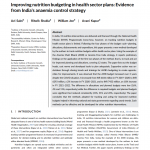
Undermining Institutions
4 February 2011
The United Progressive Alliance’s (UPA) response to the crisis caused by the 2 G scam is monumentally shortsighted and runs the risk of losing what could well be a real opportunity for restoring institutional credibility and creating effective systems of accountability in our governance structures.Let’s look at the most recent of events. In the last few weeks the Telecom Minister, Kapil Sibal and the Comptroller Auditor General (CAG) have locked horns over the findings of the CAG report on the allocation of 2 G Licenses. The Telecom Ministry is arguing that the report – especially in its calculations of the estimated loss to the government – is fraught with ‘serious errors.’ In a television interview, Mr. Sibal also suggested that someone in the CAG was responsible for the leaks that preceded the tabling of the report in Parliament. Most commentators agree that question of the magnitude of the loss is open to debate. And there is little doubt that a report being leaked is a matter of serious concern. But this on-going battle between the government and the CAG points to a much bigger set of issues that must be debated.
First and foremost, in critiquing the CAG report, the government has significantly undermined the constitutional authority of the institution of the CAG. As the supreme audit institution of India, the CAG is constitutionally mandated to act as a watch dog and ensure accountability and transparency in government finances. The constitution accords the CAG a great degree of autonomy so as to free the institution from political pressures. The CAG can only be removed by the same process as that of a Supreme Court judge. CAG reports are submitted to the Public Accounts Committee (PAC) of Parliament that scrutinizes these reports and follow up on action taken by ministries. In challenging the findings of the CAG report and questioning its conduct in the 2 G case, the government has made the CAG vulnerable to political manipulation and attack of its formal powers. This is ironic especially given that the government has put its political weight behind the PAC whose investigation into the 2 G scam is based on the very CAG report that the government is seeking to debunk!
But perhaps what is most worrying is that this critique of the CAG comes at a time when most of our institutions are facing a crisis of credibility. Whether it’s the judiciary, the CBI, the Information Commission or the CVC, these institutions are seen to be steeped in inefficiency and corruption and public trust has hit an all time low. By attacking the credibility of the CAG, perhaps the last of our public institutions to command public respect, the government has displayed monumental short sightedness. After all, if the CAG cannot ensure financial probity, who can?
In undermining the CAG, the UPA is also losing what could have been a historical opportunity to restore institutional probity. If there is one positive outcome of the current crisis it is the increased public clamour for institutional reform and public accountability. Responding to this pressure, the UPA has even come up with a menu of reform solutions ranging from the creation of new agencies to checking discretionary powers and state funding of elections. But these solutions simply miss the point. What we need are not new agencies or procedures. After all, the constitution already provides us with an array of institutional checks and balances. What we need is a real commitment to strengthen the day to day functioning of these institutions and ensuring that they are embedded in norms of accountability and transparency. Rather than resort to a battle of wits to score political points and challenge institutional credibility the UPA could well have chosen to set an example by accepting responsibility and submitting itself to a transparent investigation. But then, perhaps there would have been no crisis!
Yamini Aiyar is Director of the Accountability Initiative.





